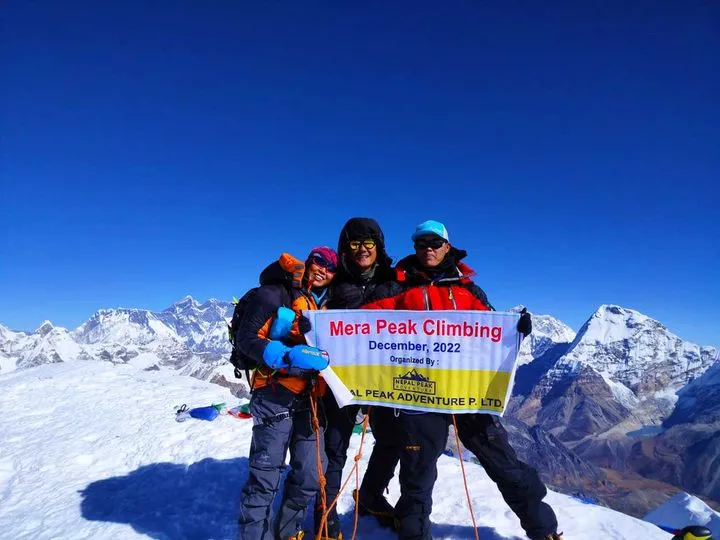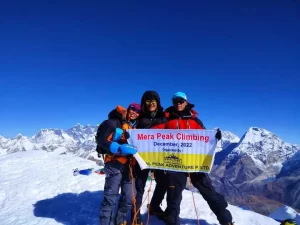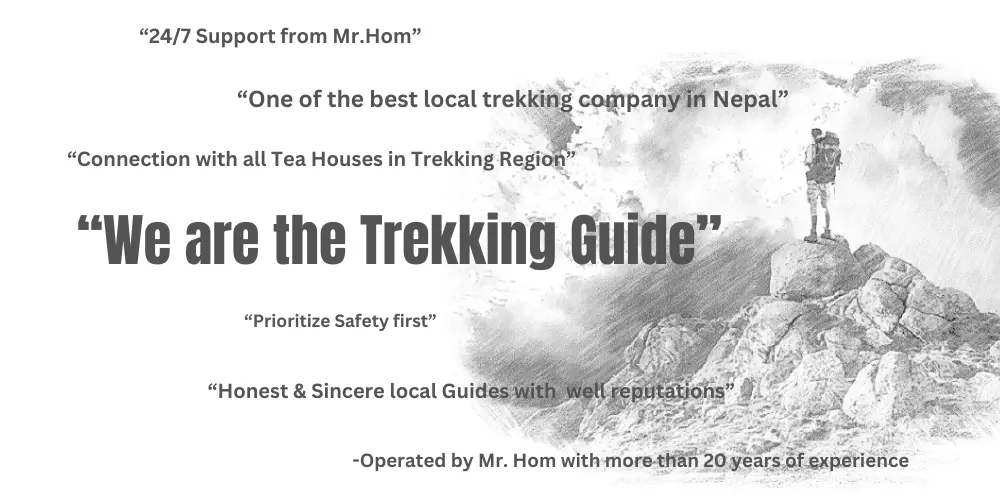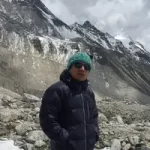Embark on an extraordinary journey with Nepal Peak Adventure's exclusive 22-day package, offering an exhilarating blend of trekking and climbing amidst the awe-inspiring landscapes of the Himalayas. This expedition is centered around conquering two of Nepal's most sought-after trekking peaks - Mera Peak and Island Peak, promising a once-in-a-lifetime experience that will leave you with unforgettable memories.
Our meticulously crafted itinerary is tailored for adventure enthusiasts seeking the thrill of ascending not one, but two iconic trekking peaks in the Khumbu region. First on the list is Mera Peak, soaring proudly at an impressive height of 6,476 meters (21,247 feet) and the second is Island Peak standing tall at 6,189 meters (20,305 feet). These two majestic peak presents an exhilarating challenge, rewarding climbers with breathtaking panoramas of the surrounding peaks and valleys.
Mera Peak - The Ascent of Grandeur:
The journey begins as you set foot in Kathmandu, where you will be warmly welcomed by our expert team. After a brief orientation and preparation, we venture into the beautiful Hinku Valley, surrounded by lush rhododendron forests and captivating views of the Mera Glacier. Our ascent to Mera Peak Base Camp at 5,300 meters (17,388 feet) allows for acclimatization, vital for successful summit attempts.
As we progress, we navigate through the stunning Mera La Pass and enter the upper reaches of the peak. The thrill intensifies as we ascend the snow-covered slopes and traverse the challenging glacier terrain, leading us to the high camp. Here, under the guidance of our experienced mountaineers, you'll learn essential techniques for safe climbing.
At the crack of dawn, the Mera Peak summit bid commences. The exhilarating climb reveals the vast Himalayan panorama, including Everest, Makalu, Cho Oyu, and Kanchenjunga, among other stunning peaks. This awe-inspiring vista is a reward beyond compare, etching memories that will last a lifetime.
Traversing the Amphu Lapcha Pass:
With Mera Peak triumphantly conquered, we venture further into the realm of Himalayan exploration. The journey leads us to the formidable Amphu Lapcha Pass, a technically challenging traverse that connects the Everest and Makalu regions. As we negotiate this high-altitude pass, breathtaking views of the surrounding peaks captivate the senses, making it a highlight of the expedition.
The Amphu Lapcha Pass not only adds to the adventure but also serves as essential preparation for the upcoming Island Peak climb, testing our climbing skills and endurance before reaching the ultimate destination.
Island Peak - Conquering the Icon:
Next on our agenda is Island Peak, also known as Imja Tse. Standing proudly at 6,189 meters (20,305 feet), this stunning peak offers a thrilling yet manageable climb, making it an ideal choice for climbers seeking to summit a Himalayan peak.
The journey to Island Peak Base Camp involves trekking through the iconic Everest trail, where we soak in the rich culture and hospitality of the Sherpa people. As we approach the Base Camp, we fine-tune our climbing skills in preparation for the final ascent.
Under the guidance of our experienced climbing guides, we make our way up the glaciated slopes and negotiate the challenging rocky sections, leading us to the summit ridge. Upon reaching the top, a profound sense of accomplishment washes over us, as we stand triumphantly surrounded by breathtaking views of Ama Dablam, Lhotse, and the pristine Everest.
Immersed in Himalayan Beauty:
Throughout this epic journey, you'll be immersed in the awe-inspiring beauty of the Khumbu region. The trail takes us through picturesque Sherpa villages, where we encounter warm smiles and the rich cultural heritage of the Himalayan people. We cross swinging suspension bridges over roaring rivers and trek through enchanting rhododendron and pine forests, offering a true communion with nature.
Mera Peak and Island Peak Climbing Highlights
- The Ultimate Multi-Peak Adventure: Conquer two iconic trekking peaks - Mera Peak and Island Peak - in one epic journey.
- Breathtaking Himalayan Panorama: Enjoy awe-inspiring views of Everest, Lhotse, Makalu, Cho Oyu, and more from the summits.
- Amphu Lapcha Pass Traverse: Challenge yourself with a technical traverse linking the Everest and Makalu regions.
- Immersive Cultural Experience: Engage with the warm hospitality and rich culture of the Sherpa people during your trek.
- Diverse Landscapes: Trek through rhododendron forests, cross swinging suspension bridges, and explore glacial landscapes.
- Expert Guidance and Safety: Climb with experienced mountaineers and guides, prioritizing safety at every step.
- Summiting Mera Peak (6,476m/21,247ft): Stand atop the highest trekking peak in Nepal for a sense of accomplishment.
- Scaling Island Peak (6,189m/20,305ft): Experience the thrill of ascending Island Peak, a challenging yet achievable climb.
- Cultural Highlights in Kathmandu: Explore Kathmandu's vibrant city, visiting ancient temples and World Heritage sites.
Why Choose Nepal Peak Adventure for the Mera and Island Peak?
At Nepal Peak Adventure, we prioritize safety, expertise, and responsible trekking practices. Our highly skilled team of guides and mountaineers boasts years of experience, ensuring your safety and success in reaching the summits. We provide top-notch climbing equipment, weather updates, and medical support to ensure a seamless and secure expedition.
Embark on the journey of a lifetime with Nepal Peak Adventure's Mera Peak and Island Peak expedition. This exclusive 22-day package offers the ultimate multi-peak climbing adventure, traversing the picturesque Amphu Lapcha Pass and conquering two of Nepal's most popular trekking peaks. Unleash the explorer within you, as you immerse yourself in the breathtaking Himalayan beauty and create memories that will stay etched in your heart forever. Are you ready to embrace the mountains? Join us and make your Himalayan dreams come true!
Outline Itinerary
Day 01: Arrival in Kathmandu and transfer to the hotel
Day 02: Trek preparation, sightseeing, and rest day
Day 03: Fly to Lukla (2,850m) and trek to Chhuthang (3,020m) – 3 hrs
Day 04: Trek to Thuli Kharka via Zatrawala Pass (4,620m) - 6/7 hrs
Day 05: Trek to Kothe (4,182m) – 4 to 5 hrs
Day 06: Trek from Kothe to Thangnak (4,326m) - 4/5 hrs
Day 07: Trek from Thangnak to Khare (5,000m) - 5/6 hrs
Day 08: Acclimatize at Khare
Day 09: Trek from Khare to Mera Base Camp (5,300m) - 5/6 hrs
Day 10: Trek to Mera High Camp (5,800m) or Leisure Day for bad weather
Day 11: Summit Mera Peak (6,461m) and descend to Kongma Dingma (4,800m) - 8/9 hrs
Day 12: Trek from Kongma Dingma to Seto Pokhari via Hinku Valley - 5/6 hrs
Day 13: Trek from Seto Pokhari to Amphu Lapcha Base Camp (South) (5,650m) - 5/6 hrs
Day 14: Trek to Amphu Lapcha Base Camp (North) via Amphu Lapcha La Pass (5,845m) - 6/7 hrs
Day 15: Trek to Island Peak Base Camp (5,100m) - 5/6 hrs
Day 16: Acclimatization day at Island Peak Base Camp
Day 17: Climb Island Peak (6,189 m) & Descend to Chhukung - 8/10 hrs
Day 18: Spare Day/Contingency
Day 19: Trek to Namche Bazaar (3,440m) - 7 hrs
Day 20: Trek from Namche Bazaar to Lukla - 6/7 hrs
Day 21: Fly from Lukla to Kathmandu
Day 22: Transfer to International Airport for Departure
Cost Inclusion & Exclusion:
- All airport and hotel transfers by private vehicle
- Welcome dinner
- Three night’s accommodation in star category hotel (Hotel Blue Horizon) in Kathmandu on the basis of twin sharing with breakfast
- Teahouse and tented accommodation during trekking and climbing
- Full-day Kathmandu Valley sightseeing tour including the cost of Tour guide, private transportation, and entrance fees to World Heritage Sites
- Domestic flight: Kathmandu-Lukla-Kathmandu
- Full board meals including meals Breakfast, Lunch, and Dinner with tea/coffee on every meal during the trek
- Experienced and qualified climbing and trekking guide
- One porter for two trekkers
- Crew and Support team fee
- All trekking and climbing permits
- All necessary paper works
- Coverage of guides and porter's meals, insurance, salary, lodging, transportation, flight and other necessary equipment
- First aid kit
- Arrangement of Sleeping bags and Down Jacket for the climbing and trekking
- Catering extra dietary requirements
- All Government and Local Taxes
- Assistance in arranging rescue operations in case of complicated health conditions (funded by travel insurance).
- Company t-shirt and cap
- Duffel bag
- Certification of achievement
- Farewell dinner
Cost Exclusion
- International Flight
- Nepal Visa fee
- Excess baggage charges
- Lunch and Dinner in Kathmandu
- Extra night accommodation in Kathmandu due to early arrival, late departure, or early return from trekking (because of any reason) prior to the plan scheduled itinerary.
- Personal expenses such as shopping, snacks, bar bills, bottle or boiled water, shower, Wi-Fi, laundry, telephone call,s, etc
- Personal clothing, gear, and equipment
- Altitude chamber (PAC) or oxygen
- Travel Insurance
- Tips for guide and porters.
- All things which are not mentioned in the inclusion
Best time to climb Mera Peak and Island Peak
The best time for the Mera Peak and Island Peak climbing expedition is during the pre-monsoon (spring) and post-monsoon (autumn) seasons which offer the most favorable weather and climbing conditions.
From March to May, the pre-monsoon season, the weather is generally stable with clear skies and minimal precipitation. The temperatures are moderate, creating comfortable conditions for trekking and climbing. Moreover, the rhododendron forests along the trail are in full bloom, adding a touch of vibrant colors to the journey.
On the other hand, the post-monsoon season, from September to November, offers excellent climbing conditions as the monsoon rains have cleared the skies, providing stunning mountain views and great visibility. The temperatures are pleasant, and the trails are dry and less muddy, making the expedition more enjoyable. Autumn also attracts a considerable number of trekkers and climbers, creating a lively and enthusiastic atmosphere along the route.
However, even during these peak seasons, it's crucial to plan the expedition with a reputable trekking company that prioritizes safety and has experienced guides to ensure a successful and secure climbing experience in unpredictable mountains.
Food and Accommodation during the Trip
The Mera and Island Peak expedition offers an all-inclusive package, ensuring that all your food and lodging needs are taken care of throughout the trip. From the moment you arrive in Kathmandu, you can rest assured that your accommodation will be at a comfortable three-star category hotel, providing a pleasant stay before and after the adventure.
During the trekking period, you will be accommodated in cozy lodges or teahouses along the route, immersing you in the authentic Himalayan experience. For adventurous camping nights, comfortable camping tents will be provided, allowing you to rest well amidst the breathtaking mountain scenery.
To keep you fueled and energized throughout the entire journey, the package includes full board meals, encompassing breakfast, lunch, and dinner. While trekking, the teahouses will serve delectable meals that cater to your dietary preferences. On the camping sites, our skilled kitchen staff will prepare delicious and nutritious meals, ensuring you receive hearty sustenance during the challenging climbs.
Moreover, the package goes beyond just the essentials, as it also encompasses a welcome dinner to greet you warmly upon arrival in Kathmandu and a memorable farewell dinner to celebrate the successful completion of your expedition. With food and accommodation fully taken care of, you can focus solely on enjoying the wonders of the Himalayas and creating unforgettable memories on the Mera and Island Peak adventure.
Mera Peak vs. Island Peak: A Comparison of Two Himalayan Treks
Mera Peak and Island Peak are two renowned trekking peaks in Nepal's Khumbu region, attracting adventure enthusiasts seeking to conquer Himalayan summits. Mera Peak stands as the highest trekking peak in Nepal, soaring to 6,476 meters (21,247 feet) in elevation. Its ascent involves glacier crossings and moderately steep slopes, demanding basic mountaineering skills and experience.
On the other hand, Island Peak, also known as Imja Tse, reaches an altitude of 6,189 meters (20,305 feet), making it slightly lower than Mera Peak. The climb to Island Peak is considered less technical than Mera Peak, making it more accessible to climbers with limited mountaineering experience, although proper acclimatization and basic climbing skills are still essential.
Both treks offer breathtaking scenery and stunning views of the surrounding Himalayan giants. Mera Peak takes adventurers through the pristine Hinku Valley, while Island Peak combines the classic Everest Base Camp trail with the ascent.
Ultimately, the choice between Mera Peak and Island Peak depends on one's preference for altitude, technical challenges, and the desire for a more remote or well-trodden trail. Both expeditions promise an unforgettable Himalayan adventure.
How difficult is Mera and Island Peak climbing?
Both Mera Peak and Island Peak climbs require a certain level of mountaineering abilities, making them more suitable for individuals with prior trekking or climbing experience.
Island Peak is considered more technically challenging than Mera Peak, involving glacier crossings, steep slopes, and the use of basic mountaineering skills like rope techniques and ice axe use. This makes it quite challenging for beginners, as it demands a good understanding of mountaineering techniques.
Additionally, both peaks are situated at high altitudes, increasing the risk of altitude sickness, and climbers need to be aware of the symptoms and take necessary precautions. Unpredictable weather conditions in the Himalayas further add to the complexity of the climbs, requiring climbers to be flexible and prepared for sudden changes. Knowledge of mountaineering and the ability to navigate through crevasses are essential skills for tackling these peaks safely.
It's crucial for climbers to choose reputable guides and trekking companies that prioritize safety and provide proper acclimatization strategies to ensure a successful and rewarding climb.
Know in detail: Mera Peak Climbing Difficulty, Island Peak Climbing Difficulty
What are the permits required for the Mera and Island Peak Climb via Amphu Laptsa Pass?
Climbers are required to obtain the following permits to climb Mera Peak and Island Peak
- NMA (Nepal Mountaineering Association) Permit
- Makalu Barun National Park Entry Permit
- Sagarmatha National Park Entry Permit
- Local Area Permit (Khumbu Rural Municipality Entrance permit)
Obtaining the necessary permits is a crucial part of preparing for the Mera and Island Peak Climb. It is advisable to complete the permit application process well in advance and with the assistance of an experienced trekking agency to ensure a smooth and legally compliant journey.
We at Nepal Peak Adventure obtain all these permits which are included in the package cost.
Preparing for the Climb: Training Tips
Preparing for the Mera Peak and Island Peak climb is a crucial step in ensuring a safe, successful, and enjoyable expedition. These peaks pose significant challenges, including high altitudes, technical climbing sections, and unpredictable weather conditions. Therefore, thorough training and physical preparation are essential to tackle these Himalayan giants with confidence.
Cardiovascular fitness is fundamental for enduring the rigors of high-altitude climbing. Engage in activities like running, hiking, cycling, or swimming to improve your cardiovascular endurance and lung capacity, which are critical for coping with reduced oxygen levels at higher elevations.
Strength training is equally important to handle the physical demands of trekking and climbing. Focus on building strength in your core, legs, and upper body through exercises like squats, lunges, deadlifts, and upper body workouts. This will aid in carrying heavy backpacks, ascending steep slopes, and negotiating challenging terrain.
Incorporate hiking and trekking into your training regime, especially on terrains that mimic the conditions you'll encounter during the expedition. Gradually increase the duration and difficulty of your hikes to build your endurance and acclimate your body to prolonged physical exertion.
Altitude training, if feasible, can be immensely beneficial. Consider planning short treks or hikes to high-altitude regions to help your body adapt to reduced oxygen levels, reducing the risk of altitude sickness during the climb.
Furthermore, improving technical skills is essential for tackling sections with crevasses and steep slopes. If possible, take up indoor climbing or visit rock climbing facilities to gain confidence and proficiency in using climbing gear and techniques.
Remember, the climb is not just a physical challenge; it demands mental resilience as well. Practice mental preparation and maintain a positive attitude throughout your training to develop the determination needed to conquer the peaks.
Balanced nutrition and hydration play a vital role in sustaining your energy levels during the training phase. Ensure your diet is rich in protein, carbohydrates, and healthy fats, and stay well-hydrated to support your body's endurance and recovery.
Seek advice from experienced climbers or mountaineering guides during your preparation. Their insights and tips based on their own experiences can prove invaluable in helping you prepare effectively and safely for the extraordinary adventure that awaits on Mera Peak and Island Peak.
Acclimatization Days:
Acclimatization days are strategically placed at certain points during the trek to allow climbers to adapt to the increasing altitudes gradually. These rest days are crucial for minimizing the risk of altitude sickness and helping the body adjust to the reduced oxygen levels at higher elevations. During acclimatization days, climbers will stay at the same altitude or hike to a higher point and then return to sleep at a lower altitude, which aids in the acclimatization process. This ensures that climbers are better prepared to tackle the challenging ascents to Mera Peak and Island Peak.
Read More: A Guide to Proper Acclimatization for Peak Climbing in Nepal
Contingency Days:
Contingency days are essential buffer days built into the itinerary to account for unforeseen circumstances or unexpected delays during the expedition. In the mountains, weather conditions can change rapidly, and other factors like route conditions or the team's overall health may influence the schedule. Having contingency days allows for flexibility and the ability to adjust the itinerary accordingly. If the expedition faces delays due to adverse weather or other reasons, the contingency days provide the option to reschedule the climbs without compromising safety and the overall success of the expedition.
How much does it cost to climb Mere Peak and Island Peak?
The cost of climbing Mera Peak and Island Peak can vary depending on several factors, including the trekking agency, the package inclusions, the duration of the expedition, and the number of climbers in the group. On average, the cost of climbing Mera Peak and Island Peak can range from USD 3,000 to USD 5,000 per person.
It's important to note that the cost usually covers essential services such as permits, accommodation, meals, experienced guides, porters, and necessary climbing equipment. Additional factors that can influence the cost include transportation to and from the trekking starting point, international flights, travel insurance, personal gear, and tips for guides and support staff.
Know More in detail: Mera Peak Climbing Cost, Island Peak Climbing Cost
Crew and Support Team for the Mera Peak and Island Peak
Nepal Peak Adventure takes immense pride in providing a highly skilled and dedicated crew and support team for the Mera Peak and Island Peak climbing expedition. Our team comprises experienced and certified mountaineering guides, porters, and kitchen staff, all committed to ensuring your safety, comfort, and success throughout the journey.
Experienced Mountaineering Guides: Our team of seasoned mountaineering guides brings extensive expertise in Himalayan climbing. They are well-versed in the routes, technical aspects, and challenges of Mera Peak and Island Peak climbs. With their vast knowledge and keen understanding of the mountains, our guides will lead you confidently, ensuring proper acclimatization, providing valuable tips, and making real-time decisions for your safety.
Professional Porters: Our porters are an integral part of the expedition, responsibly carrying essential equipment and supplies, allowing you to focus on the climb without the burden of heavy loads. Trained in the best practices of load management, our porters ensure that your belongings reach each destination safely and efficiently.
Skilled Kitchen Staff: Our experienced kitchen staff takes pride in providing delicious and nourishing meals during the trek and camping nights. They understand the significance of proper nutrition during the expedition and cater to your dietary preferences, ensuring you stay energized throughout the challenging climbs.
Safety and Support Team: We prioritize safety above all else. Our support team includes first aid-trained staff and emergency communication systems, ensuring prompt response and assistance in case of any unforeseen circumstances.
Frequently Asked Questions
Do I need prior climbing experience to attempt Mera and Island Peak?
Yes, prior trekking or climbing experience is recommended for both Mera Peak and Island Peak expeditions. While Island Peak is more accessible to climbers with limited experience, Mera Peak's higher altitude and technical demands make some mountaineering skills essential.
How physically fit do I need to be for these climbs?
Good physical fitness is crucial for both Mera Peak and Island Peak climbs. Regular cardio exercises, strength training, and hiking in challenging terrains will help prepare you for the demanding climbs and altitude.
Are permits included in the package cost?
Yes, the climbing permits for Mera Peak and Island Peak is included in the package cost. Additionally, the package covers other essential permits, such as Sagarmatha National Park Permit and Amphu Laptsa Pass Permit.
Is safety a priority during the expedition?
Absolutely! Your safety is our top priority. We provide experienced mountaineering guides, a support team, and necessary safety equipment. Our team is well-trained in handling emergencies and ensuring a safe and successful climb.
How big are the climbing groups?
We maintain small and manageable climbing groups to ensure personalized attention and safety. The group size is usually limited to provide the best possible experience for each participant.
Is prior acclimatization considered during the expedition?
Yes, the itinerary includes acclimatization days at specific points to help climbers adapt to higher altitudes gradually. Acclimatization is essential for minimizing the risk of altitude sickness and ensuring a successful climb.
Do I need travel insurance for the trip?
Yes, travel insurance is a mandatory requirement for the Mera Peak and Island Peak climbing expedition. It is essential to have comprehensive travel insurance that covers high-altitude trekking and mountaineering activities.
The Himalayas present various risks and challenges, and having adequate travel insurance provides you with essential financial protection in case of any unforeseen events or emergencies during the trip. These can include altitude-related illnesses, injuries, flight cancellations, evacuation, and other travel-related issues.










